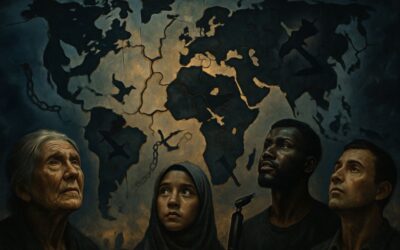In the annals of history, few stories resonate as profoundly as that of Spartacus’ uprising. It’s a tale of courage, desperation, and a yearning for freedom that ultimately underscores the futility of war and the paramount importance of peace. This educational storytelling journey will take you through the life of Spartacus, his rebellion against the Roman Empire, and the timeless lessons we can glean from his struggle.
The Rise of Spartacus
Imagine the world of ancient Rome, a powerful empire marked by grandeur and oppression. Within this vast dominion, a Thracian gladiator named Spartacus emerges. Enslaved and forced into brutal combat for the entertainment of Rome’s elite, Spartacus harbors a burning desire for freedom. In 73 BC, this desire ignites a rebellion that would shake the empire to its core.
Spartacus’ uprising began in a gladiatorial school in Capua, where he and approximately 70 fellow gladiators staged a daring escape. Their initial success inspired thousands of slaves to join their cause, swelling their ranks and transforming them from a small band of rebels into a formidable army.
The Rebellion’s Course
For two years, Spartacus and his followers waged a guerrilla war against the Roman legions. Their victories were numerous and significant, demonstrating not only their tactical brilliance but also the desperate yearning for freedom that fueled their fight. However, despite their successes, the rebellion was fraught with hardship and suffering.
Spartacus’ army was not just a force of trained fighters; it included men, women, and children, all seeking liberation from the chains of slavery. The rebellion was as much a fight for survival as it was a fight for freedom. Every battle, every victory, and every loss came at a tremendous human cost.
The Inevitability of War’s Tragedy
The Roman Senate, alarmed by the uprising, eventually sent their most capable generals, including Marcus Licinius Crassus, to crush the rebellion. Despite their determination and valor, Spartacus and his followers were no match for the might of the Roman legions. In 71 BC, the rebellion met its tragic end on the battlefield.
The aftermath was brutal. Over 6,000 rebels were captured and crucified along the Appian Way, a grim reminder of Rome’s power and the high cost of resistance. Spartacus himself fell in battle, his body never found, leaving his ultimate fate shrouded in mystery.
Lessons on the Futility of War
Spartacus’ uprising is a poignant reminder of the futility of war. Despite their courage and determination, the rebels’ quest for freedom ended in unimaginable suffering. The rebellion, though noble in its intentions, ultimately brought more pain and loss.
This narrative isn’t just a historical recount; it holds powerful lessons for us today. War, regardless of its cause, often leads to destruction and sorrow. The innocent suffer, lives are lost, and the scars of conflict linger long after the battles have ended.
The Importance of Peace
Peace, on the other hand, offers a path to lasting change and prosperity. It fosters understanding, cooperation, and the building of a just society where all individuals can thrive. Spartacus’ story underscores the need to seek peaceful solutions to conflicts and to strive for justice through dialogue and mutual respect.
Consider the modern world, where conflicts and wars continue to erupt, causing immense human suffering. The lessons from Spartacus’ uprising remind us of the importance of pursuing peace against all odds. It urges us to resolve our differences through negotiation, to build bridges rather than walls, and to ensure that justice and freedom are achieved without resorting to violence.
Real-Life Examples of Peaceful Change
History is replete with examples of peaceful change. The civil rights movement in the United States, led by figures like Martin Luther King Jr., achieved monumental progress through nonviolent protest. India’s struggle for independence, championed by Mahatma Gandhi, also exemplifies how peaceful resistance can lead to profound social transformation.
These examples, like Spartacus’ story, illustrate the power of peace. They show us that while the path of peace may be challenging, it is far more rewarding and sustainable than the path of war.
Taking Action: Embracing Peace in Our Lives
As you reflect on the story of Spartacus and the lessons it imparts, consider how you can embrace peace in your own life. Whether it’s resolving personal conflicts, engaging in community-building efforts, or advocating for peaceful solutions on a larger scale, your actions can contribute to a more harmonious world.
Strive to understand others, seek common ground, and remember that true strength lies not in domination, but in compassion and cooperation. By valuing peace over conflict, you honor the legacy of those like Spartacus who sought freedom and justice, even in the face of insurmountable odds.
The story of Spartacus’ uprising teaches us that while the fight for freedom and justice is essential, the means by which we achieve these goals matter greatly. Let us commit to pursuing these noble aims through peaceful and compassionate means, ensuring that our actions lead to lasting, positive change for all.
In your journey, remember: peace is not merely the absence of war, but the presence of justice, love, and understanding. Take the lessons from Spartacus’ uprising to heart and strive to be a force for peace in your world today.
Expand Your Vocabulary
Enhance your understanding of Spartacus’ uprising and the broader themes of peace and war by exploring these ten important words and expressions mentioned in the article. Understanding these terms will help you use them effectively in everyday English.
- Annals
- Meaning: Historical records or chronicles.
- Context: The annals of history contain the story of Spartacus’ uprising.
- Usage: The annals of ancient civilizations provide fascinating insights into human history.
- Rebellion
- Meaning: An act of violent or open resistance to an established government or ruler.
- Context: Spartacus led a rebellion against the Roman Empire.
- Usage: The rebellion was sparked by the people’s dissatisfaction with their oppressive government.
- Futility
- Meaning: Pointlessness or uselessness.
- Context: The story underscores the futility of war and the paramount importance of peace.
- Usage: The futility of arguing over trivial matters became evident after hours of debate.
- Guerrilla War
- Meaning: A form of irregular warfare in which small groups of combatants use military tactics, such as ambushes, sabotage, and raids.
- Context: Spartacus and his followers waged a guerrilla war against the Roman legions.
- Usage: The guerrilla war was characterized by surprise attacks and strategic retreats.
- Tactical Brilliance
- Meaning: Exceptional skill in planning and executing military operations.
- Context: Their victories demonstrated their tactical brilliance.
- Usage: The general’s tactical brilliance led to several decisive victories in the campaign.
- Retribution
- Meaning: Punishment inflicted on someone as vengeance for a wrong or criminal act.
- Context: Over 6,000 rebels were crucified as retribution.
- Usage: The harsh retribution for the crime shocked the community.
- Human Cost
- Meaning: The suffering, loss, and hardship experienced by people.
- Context: Every battle brought tremendous human cost.
- Usage: The human cost of the conflict was devastating, with countless lives lost.
- Existence
- Meaning: The fact or state of living or having objective reality.
- Context: The rebellion was as much a fight for survival as it was for existence.
- Usage: Philosophers often ponder the meaning of human existence.
- Paramount
- Meaning: More important than anything else; supreme.
- Context: The story underscores the paramount importance of peace.
- Usage: Ensuring the safety of the community is of paramount importance.
- Nonviolent Protest
- Meaning: A way of achieving goals such as social change through symbolic protests, civil disobedience, and other nonviolent means.
- Context: The civil rights movement achieved monumental progress through nonviolent protest.
- Usage: Nonviolent protest can be a powerful tool for enacting social change.
Let’s Talk
Engage with the deeper implications of Spartacus’ uprising and the themes of war and peace by reflecting on these thought-provoking questions. Consider discussing them with friends and family to gain a broader perspective.
- Historical Impact:
- How do you think Spartacus’ uprising has influenced modern views on rebellion and resistance? Can you draw parallels with any contemporary movements?
- The Human Cost of War:
- How does understanding the human cost of war change your perspective on current global conflicts?
- Peaceful Solutions:
- What are some examples of peaceful solutions to conflicts in your own life? How can these be applied to larger societal issues?
- Nonviolent Resistance:
- How effective do you think nonviolent resistance is compared to armed rebellion? Can you think of historical examples where nonviolence led to significant change?
- Learning from History:
- What lessons can we learn from the futility of Spartacus’ rebellion in our pursuit of peace today?
- Tactical Brilliance vs. Moral Rightness:
- How do you balance tactical brilliance and strategic planning with moral and ethical considerations in decision-making?
- Personal Commitment to Peace:
- In what ways can you commit to fostering peace in your community? What actions can you take to promote understanding and cooperation?
- War and Justice:
- Can justice be achieved through war, or is it inherently tied to peace? How do you reconcile the two concepts?
- Role of Empathy:
- How important is empathy in understanding and resolving conflicts? How can empathy be cultivated in ourselves and others?
- Philosophical Reflections:
- What philosophical questions arise for you when considering the themes of war, peace, and human existence? How do these questions shape your worldview?
By contemplating these questions, you can deepen your understanding of the themes and lessons from Spartacus’ uprising. Share your thoughts and experiences in the comments below, and let’s start a meaningful conversation!










0 Comments